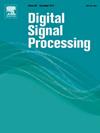DBSCAN-based particle Gaussian mixture filters
IF 3
3区 工程技术
Q2 ENGINEERING, ELECTRICAL & ELECTRONIC
引用次数: 0
Abstract
This study addresses nonlinear and non-Gaussian state estimation problems where the particle filter (PF) exhibits the impoverishment issue. This issue arises from the discretisation of the continuous posterior distribution of the state and the use of importance sampling, where the true distribution of the state is unknown. In this study, we propose density-based spatial clustering of applications with noise (DBSCAN)-based particle Gaussian mixture (PGM) filters: the PGM-DS and PGM-DU filters, where DS indicates the PGM filter with DBSCAN and DU indicates the PGM filter with DBSCAN and the unscented transform (UT). These filters assume the posterior distribution of the state to be a Gaussian mixture model (GMM) and sample particles from this GMM. At every time step, the particles are clustered into multiple Gaussian components using DBSCAN, the components are updated with the Kalman/linear minimum mean squared error (LMMSE) update, and the GMM is reconstructed with the updated means and covariances. The proposed filters are tested in three numerical simulation scenarios and compared with other state-of-the-art nonlinear filters. The results show enhanced performance and robustness across the tested simulation scenarios, with lower computational cost compared to the other filters.
基于dbscan的粒子高斯混合滤波器
本研究解决了非线性和非高斯状态估计问题,其中粒子滤波器(PF)表现出贫化问题。这个问题源于状态的连续后验分布的离散化和重要性抽样的使用,其中状态的真实分布是未知的。在本研究中,我们提出了基于密度的空间聚类应用与基于噪声(DBSCAN)的粒子高斯混合(PGM)滤波器:PGM-DS和PGM-DU滤波器,其中DS表示带有DBSCAN的PGM滤波器,DU表示带有DBSCAN和unscented变换(UT)的PGM滤波器。这些滤波器假设状态的后验分布是高斯混合模型(GMM)和来自该GMM的样本粒子。在每个时间步长,利用DBSCAN将粒子聚类成多个高斯分量,利用卡尔曼/线性最小均方误差(LMMSE)更新分量,利用更新后的均值和协方差重构高斯模型。所提出的滤波器在三种数值模拟场景中进行了测试,并与其他先进的非线性滤波器进行了比较。结果表明,与其他滤波器相比,该滤波器具有更低的计算成本,并且在测试的模拟场景中具有更高的性能和鲁棒性。
本文章由计算机程序翻译,如有差异,请以英文原文为准。
求助全文
约1分钟内获得全文
求助全文
来源期刊

Digital Signal Processing
工程技术-工程:电子与电气
CiteScore
5.30
自引率
17.20%
发文量
435
审稿时长
66 days
期刊介绍:
Digital Signal Processing: A Review Journal is one of the oldest and most established journals in the field of signal processing yet it aims to be the most innovative. The Journal invites top quality research articles at the frontiers of research in all aspects of signal processing. Our objective is to provide a platform for the publication of ground-breaking research in signal processing with both academic and industrial appeal.
The journal has a special emphasis on statistical signal processing methodology such as Bayesian signal processing, and encourages articles on emerging applications of signal processing such as:
• big data• machine learning• internet of things• information security• systems biology and computational biology,• financial time series analysis,• autonomous vehicles,• quantum computing,• neuromorphic engineering,• human-computer interaction and intelligent user interfaces,• environmental signal processing,• geophysical signal processing including seismic signal processing,• chemioinformatics and bioinformatics,• audio, visual and performance arts,• disaster management and prevention,• renewable energy,
 求助内容:
求助内容: 应助结果提醒方式:
应助结果提醒方式:


